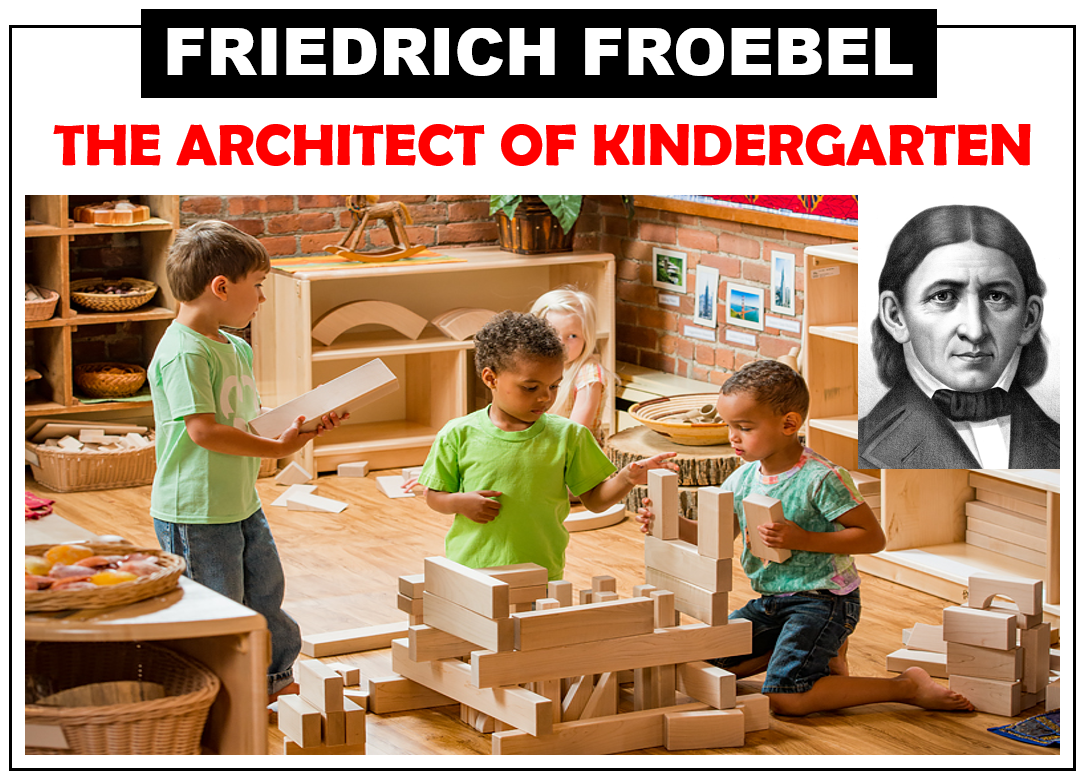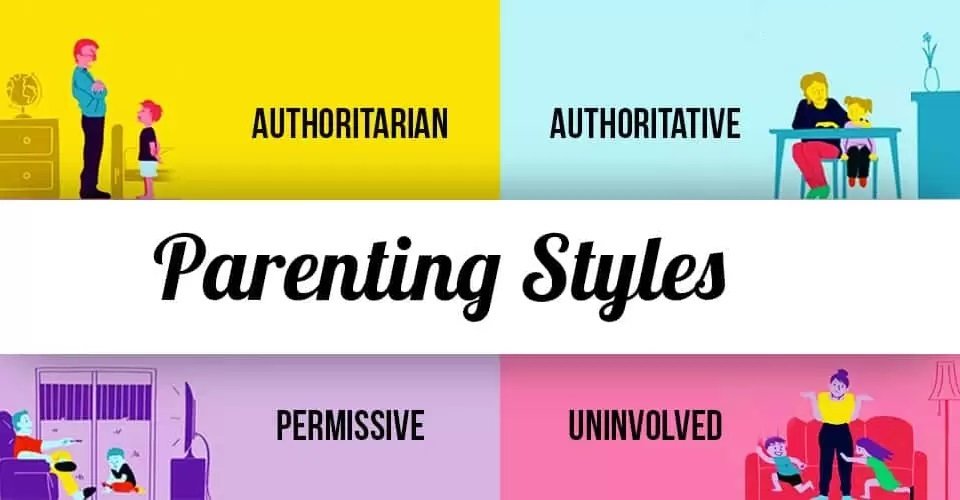
CONCEPT OF PARENTING STYLE
A parenting style is the emotional climate of parent-child interaction; this climate is inferred from how parents communicate, interact, discipline, support, monitor, and relate to their children. Within these key components, variations occur between parents; these specific variations of parenting behaviors are parenting practices whereas the underlying tone or theme across all such interactions is the parenting style.
Hence, a parenting style is a psychological construct representing standard strategies that parents use in their child rearing. Parenting styles are the representation of how parents respond and demand to their children. Parenting are specific behaviors, while parenting styles represent broader patterns of parenting practices.
The quality of parenting is far more essential than the quantity of time spent with the child. For instance, a parent can spend an entire afternoon with his or her child, yet the parent may be engaging in a different activity and not demonstrating enough interest towards the child.
ASSOCIATED TERMS
Two major dimensions characterizing parenting styles are the responsiveness and demandingness of the parents towards the children.
(1) Demandingness
Parental demandingness is the expectation for mature and responsible behavior by the child.
According to Baumrind (1966), the term demandingness refers to claims in which parents are supposed to be integrated into community and family by their maturity expectations, disciplinary efforts, supervision and willingness to confront a disruptive child.
In the same way, Simons, Simons, and Wallace (2004) argue that demandingness parenting can be judged through the level of well-defined monitoring techniques, direct confrontation and discipline patterns utilized by parents.
Therefore, it would be justified to state that parents with higher level of discipline patterns, confrontation and monitoring are demanding, whereas parents with lower level of confrontation, inconsistent discipline and monitoring are characterized as not demanding.
(2) Responsiveness
In simple words responsiveness is categorized as the degree to which parents support and attend to their child’s needs.
The term responsiveness is defined by Baumrind (1966) as the ratio of fostering self-assertion and individuality by parents being attuned, acquiescent and supportive to the demands and needs of children.
In addition, Baumrind (1966) argues that the level of responsiveness can be measured through the level of communication, reciprocity, and warmth displayed by parents while dealing with adolescents.
From this perspective, parents emphasizing on higher level of reciprocal behavior, warmth and communication are considered to be highly responsive, whereas low levels of delineated factors represent low responsiveness.
PARENTING STYLES VS PARENTING PRACTICES
Another component that can impact the outcome is the distinction between parenting style and parenting practice.
Parenting style is the emotional climate and control in which parents raise their children.
Parenting practices are specific actions that parents employ in their parenting.
Even for parents with the same parenting style, they may choose to different ways or different approach to implement specific parenting practices and that will affect the degree of outcomes.
TYPES OF PARENTING STYLES
The parenting styles commonly used in psychology today are based on the work of psychologist Diana Baumrind, a developmental psychologist at the University of California at Berkeley, in the 1960s. Maccoby and Martin also contributed by refining the model in the 1980s.
Baumrind noticed that preschoolers exhibited distinctly different types of behavior. Each type of behavior was highly correlated to a specific kind of parenting.
Diana Baumrind conducted a study on more than 100 preschool-age children. Using naturalistic observation, parental interviews, and other research methods, she identified some important dimensions of parenting. These dimensions include disciplinary strategies, warmth and nurturing, communication styles, and expectations of maturity and control. Based on these dimensions, Baumrind suggested that the majority of parents display one of three different parenting styles. Based on extensive observation, interviews and analyses, Baumrind initially identified these three parenting styles as:
(1) Authoritative parenting
(2) Authoritarian parenting
(3) Permissive parenting
Although Diana Baumrind is known for her work on categorizing parenting styles, Maccoby and Martin (1983) were the ones who expanded this 3-parenting-styles model using a two-dimensional framework.
They expanded Baumrind’s permissive parenting style into two different types:
(1) Permissive style (also known as indulgent parenting style).
(2) Neglectful parenting (also known as uninvolved parenting style).
These four parenting styles are sometimes called the Diana Baumrind parenting styles or Maccoby and Martin parenting styles.
Hence, the four types of parenting styles are:
(1) Authoritative
(2) Authoritarian (or Disciplinarian)
(3) Permissive (or Indulgent)
(4) Neglectful (or Uninvolved)
|
|
High Demandingness |
Low Demandingness |
|
High Responsiveness |
Authoritative Parenting Style |
Permissive Parenting Style |
|
Low Responsiveness |
Authoritarian Parenting Style |
Neglectful Parenting Style |
(1) Authoritative Parenting
(HIGH DEMANDINGNESS, HIGH RESPONSIVENSS)
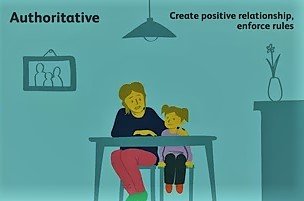
Baumrind first introduced the concept of authoritative parenting style. According to Baumrind (1966), the authoritative parents provide guidance to their children on issue oriented and rational manner. Since the level of demandingness is higher in this parenting style, parents usually welcome effective communication as well as effective relationship between them.
Authoritative parents have rules and they use consequences, but they also take their children's opinions into account. They validate their children's feelings, while also making it clear that the adults are ultimately in charge.
Authoritative parents invest time and energy into preventing behavior problems before they start. They also use positive discipline strategies to reinforce positive behavior, like praise and reward systems.
These parents encourage verbal give-and take, express reasoning behind rules and use power, reason, and shaping to strengthen objectives. This style of parenting is more associated with positive adolescent outcomes.
How it might affect kids:
Authoritative parenting is widely considered to be a healthy approach for kids. Researchers have found kids who have authoritative parents are most likely to become responsible adults who feel comfortable expressing their opinions. Children raised with authoritative discipline tend to be happy and successful. They're also more likely to be good at making decisions and evaluating safety risks on their own.
Based on Baumrind’s research on parenting styles, children of authoritative parents tend to:
- Appear happy and content.
- Are more independent.
- Are more active.
- Achieve higher academic performance.
- Develop good self-esteem.
- Interact with peers using competent social skills.
- Have better mental health — less depression, anxiety, suicide attempts, delinquency, alcohol and drug use.
- Exhibit less violent tendencies.
- Are securely attached.
(2) Authoritarian (or Disciplinarian) Parenting
(HIGH DEMANDINGNESS, LOW REPONSIVENESS)
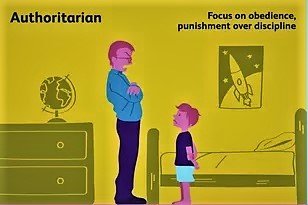
Although authoritarian parenting and authoritative parenting styles have similar names, they have several important differences in parenting belief, demand and approach.
Authoritarian parents believe kids should follow the rules without exception. The authoritarian parents attempt to evaluate, shape and control the attitudes as well as behavior of their children in line with set standards of conduct, known as absolute standard. In the light of this absolute standard, children are supposed to follow very strict rules defined by their parents. In case the children fail to comply with such rules they are punished.
Authoritarian parents are famous for saying, "Because I said so," when a child questions the reasons behind a rule. They are not interested in negotiating and their focus is on obedience.
How it might affect kids:
Teaching kids to have respect for rules can be a good thing. And some experts say that due to the strictness of this parenting style, children of authoritarian parents tend to think about their actions before they do something, so they are less likely to make impulsive choices. Children of authoritarian parents tend to be high achieving academically and disciplined, independent and self motivated. But research shows that an overly rigid approach can also put pressure on children to be perfect and might make them prone to internalizing behaviors like feeling withdrawn, lonely or afraid.
Children whose parents have an authoritarian parenting style tend to:
- Have an unhappy disposition.
- Be less independent.
- Appear insecure.
- Possess low self-esteem.
- Exhibit more behavioral problems or conduct issues.
- More temper tantrums.
- Perform worse academically.
- Have poorer social competence.
- Be more prone to mental issues.
- Be more likely to have drug use problems.
- Have worse coping skills.
(3) Permissive (or Indulgent) Parenting
(LOW DEMANDINGNESS, HIGH RESPONSIVENESS)
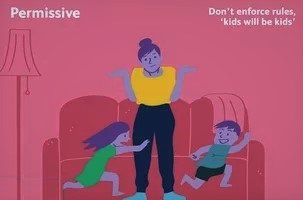
According to Baumrind (1966), permissive parents attempt to behave in acceptant, affirmative and non-punitive manner toward their children’s impulses, actions and desires. Considering the definition proposed by Baumrind that this parenting style tends to have a higher level of responsiveness, it implies that a responsive parent is more likely to define and determine rules associated with family, while encouraging the adolescents to consider it as a resource.
Permissive parents are lenient. They often only step in when there's a serious problem. They're quite forgiving and they adopt an attitude of "kids will be kids." When they do use consequences, they may not make those consequences stick. They might give privileges back if a child begs or they may allow a child to get out of time-out early if he promises to be good.
Permissive parents usually take on more of a friend role than a parent role. They often encourage their children to talk with them about their problems, but they usually don't put much effort into discouraging poor choices or bad behavior.
How it might affect kids:
Children of permissive parents tend to be free thinkers who aren’t afraid to speak their minds. That might mean more creativity, for example. But being raised in a household without many limits can have some downsides, as being told "no" at home is a way for children to adapt to the reality that boundaries exist in every part of their outside worlds.
Kids who grow up with permissive parents are more likely to struggle academically. They may exhibit more behavioral problems as they don't appreciate authority and rules. They often have low self-esteem and may report a lot of sadness.
Children of permissive parents tend to have the worst outcomes:
- Cannot follow rules.
- Have worse self-control.
- Possess egocentric tendencies.
- Encounter more problems in relationships and social interactions.
(4) Neglectful (or Uninvolved) Parenting
(LOW DEMANDINGNESS, LOW RESPONSIVENESS)

In addition to the three major styles introduced by Baumrind, psychologists Eleanor Maccoby and John Martin proposed a fourth style: uninvolved or neglectful parenting.
Neglecting parents are those that show very low level of involvement as well as strictness with their child, i.e. the neglecting parents are neither responsive nor demanding.
Uninvolved parents tend to have little knowledge of what their children are doing. There tend to be few rules. Children may not receive much guidance, nurturing, and parental attention.
Uninvolved parents expect children to raise themselves. They don't devote much time or energy into meeting children's basic needs. Uninvolved parents may be neglectful but it's not always intentional. A parent with mental health issues or substance abuse problems, for example, may not be able to care for a child's physical or emotional needs on a consistent basis.
At other times, uninvolved parents lack knowledge about child development. And sometimes, they're simply overwhelmed with other problems, like work, paying bills, and managing a household.
How it might affect kids:
Almost every expert agrees that uninvolved parenting sets children up for serious problems. Research shows that kids of uninvolved parents tend to have low self-esteem, and they can have a hard time forming healthy, trusting relationships with others.
Children of neglectful parents tend to have:
- Are more impulsive.
- Cannot self-regulate emotion.
- Encounter more delinquent behavior and addictions problems.
- Have more mental issues — e.g. suicidal behavior in adolescents.
IMPACT OF PARENTING STYLES
What effect do these parenting styles have on child development outcomes? In addition to Baumrind's initial study of 100 preschool children, researchers have conducted a a number of studies about the impact of parenting styles on children. Among the findings:
- Authoritarian parenting styles generally lead to children who are obedient and proficient, but they rank lower in happiness, social competence, and self-esteem.
- Authoritative parenting styles tend to result in children who are happy, capable, and successful.
- Permissive parenting styles often results in children who rank low in happiness and self-regulation. These children are more likely to experience problems with authority and tend to perform poorly in school.
- Uninvolved parenting styles rank lowest across all life domains. These children tend to lack self-control, have low self-esteem, and are less competent than their peers.
WHICH PARENTING STYLE IS THE MOST EFFECTIVE
From decades of studies, research shows that authoritative parenting is consistently linked to the best outcomes in kids.
This classification of child rearing styles has been studied for over 25 years in different countries and is considered the best parenting style by psychologists and psychiatrists.
Because authoritative parents are more likely to be viewed as reasonable, fair, and just, their children are more likely to comply with their parents' requests. Also, because these parents provide rules as well as explanations for these rules, children are much more likely to internalize these lessons.
Rather than simply following the rules because they fear punishment (as they might with authoritarian parents), the children of authoritative parents are able to see why the rules exist, understand that they are fair and acceptable, and strive to follow these rules to meet their own internalized sense of what is right and wrong.
LIMITATIONS AND CRITICISMS OF PARENTING STYLE RESEARCH
Links between parenting styles and behavior are based on correlational research, which is helpful for finding relationships between variables but cannot establish definitive cause-and-effect relationships. While there is evidence that a particular parenting style is linked to a certain pattern of behavior, other important variables such as a child's temperament can also play a major role.
There is also some evidence that a child's behavior can impact parenting styles. One study published in 2006 found that the parents of children who exhibited difficult behavior began to exhibit less parental control over time. Such results suggest that kids might misbehave not because their parents were too permissive, but because the parents of difficult or aggressive children gave up on trying to control their kids.
The researchers have also noted that the correlations between parenting styles and behaviors are sometimes weak. In many cases, the expected child outcomes do not materialize; parents with authoritative styles have children who are defiant or who engage in delinquent behavior, while parents with permissive styles have children who are self-confident and academically successful.
Cultural factors also play an important role in parenting styles and child outcomes. "There is no universally "best" style of parenting," writes author Douglas Bernstein in his book Essentials of Psychology. "Authoritative parenting, which is so consistently linked with positive outcomes in European American families, is not related to better school performance among African American or Asian American youngsters."
CONCLUSION
Parenting is one of the most important part of the environment a child is exposed to since birth. Good parenting’s impact on a child is significant and undeniable.
Parenting styles are associated with different child outcomes, and the authoritative style is generally linked to positive behaviors such as strong self-esteem and self-competence. However, other important factors including culture, children's temperament, children's perceptions of parental treatment, and social influences also play an important role in children's behavior.
The parenting styles of individual parents also combine to create a unique blend in each family. For example, the mother may display an authoritative style while the father favors a more permissive approach.
This can sometimes lead to mixed signals. In order to create a cohesive approach to parenting, it is essential that parents learn to cooperate and combine their unique parenting styles.



